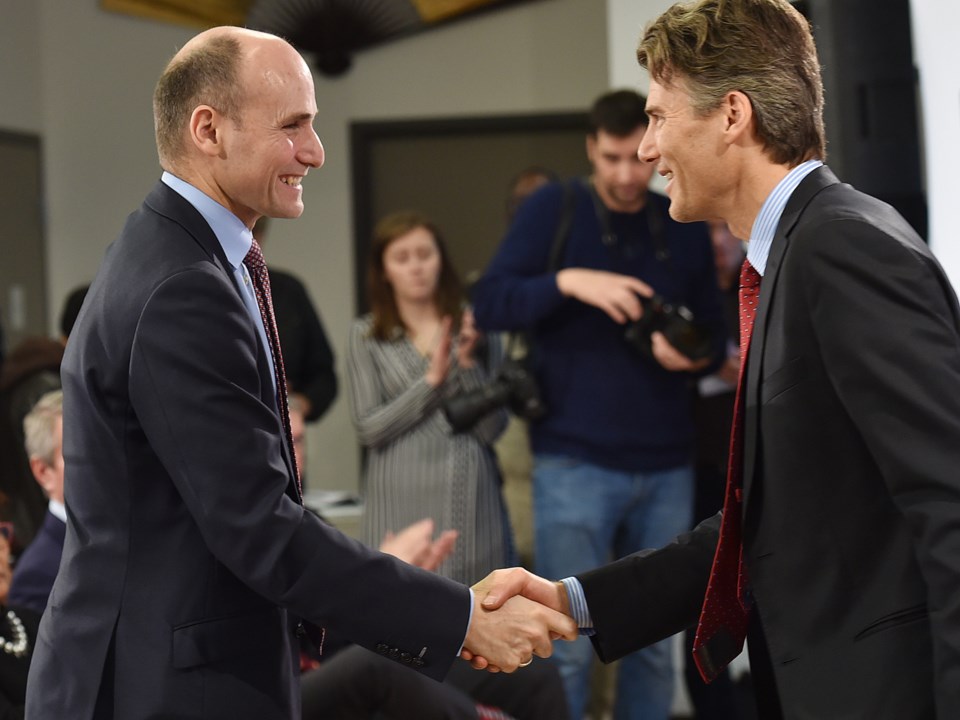The federal government unveiled a $40-billion, 10-year national housing strategy Wednesday that aims to reduce chronic homelessness by 50 per cent in Canada.
The strategy also promises to improve the availability and quality of housing and ensure at least 25 per cent of funds go to projects for women, girls and their families.
“The federal government is back in housing — and in a big way — with more ambition, more money and a greater desire to collaborate,” said Jean-Yves Duclos, the federal minister responsible for housing, at a news conference at the Woodward’s building in the Downtown Eastside.
But how much of the $40 billion the B.C. government will receive, and how much of it will be dedicated to Vancouver projects, remained unclear after Duclos declined to give specifics.
“In fact, many of these details are not yet finalized,” he said of the strategy which also promises a rent supplement program in 2020 that will deliver an average of $2,500 per year to 300,000 low-income households.
Housing Minister Selina Robinson and Mayor Gregor Robertson joined Duclos Wednesday and welcomed the news of a national strategy to tackle affordability and homelessness.
Robinson told the Courier after the announcement that the B.C. government will work on a bi-lateral agreement with the federal government to finalize the province’s portion of the funding.
The NDP-led government promised in its election campaign earlier this year to build 114,000 rental and co-op homes over 10 years, and provide renters with an annual cheque for $400.
“We’ve made commitments and we’re going to follow through on them, and now we have a fabulous partner to work with,” said Robinson, who acknowledged the national strategy expects the province to match some of the high-priced investments.
The mayor told reporters he expects Vancouver to get its “fair share” of funding to help address affordability and the city’s homelessness crisis.
A regional homeless count conducted in March revealed 2,138 people in Vancouver are homeless, with 537 of those living on the street. The vacancy rate is less than one per cent and the average rent for a one-bedroom apartment is about $2,000, according to apartment-hunting website PadMapper.com.
That price for rent, however, is disputed in a Canada Mortgage and Housing Corporation rental survey done in 2016, which showed rents for a used one-bedroom in Vancouver at just over $1,000 per month, and up to $2,000 for a one-bedroom in a new building.
Robertson said the federal government’s announcement was “good timing” because city council will discuss Vancouver’s new housing strategy at a meeting next week. The city has set a target of getting 72,000 homes built over the next 10 years.
“We need the federal government as partners,” Robertson said. “It’s great to see them put together their overall strategy. And now we need to get to the action and make sure that we can get the housing built, get people off the streets and in to housing that they can afford.”
A staff report to Vancouver city council in July showed that more than 18,000 "renter households" spend more than 50 per cent of their income on rent.
Almost 5,000 people are on a wait list for social housing in Vancouver and there's been a 43 per cent decrease since 2007 in private single-room-occupancy rooms affordable to those on income assistance.
The strategy promises to meet the needs of seniors, Indigenous peoples, survivors of family violence, people with disabilities, refugees, veterans and others grappling with homelessness.
Duclos is a member of a Liberal government that was elected in October 2015. He was asked by a reporter Wednesday whether the housing strategy would survive, if the Liberals aren’t in government during the duration of the 10-year plan.
“Well, democracies are democracies,” he said, but noted the “human rights-based” strategy calls for accountability measures enshrined in law that trigger a review every three years. “It will make sure that future federal governments live up to the expectations that we all have for the federal government.”
Other targets of the strategy include creating four times the number of new housing units that were built between 2005 and 2015 under federal programs.
The government also committed to repair three times the number of existing units that were repaired during the same 10-year period. A national housing council, a federal housing advocate and a community-based “tenant initiative” are other pieces of the strategy.
The announcement was made the day after child and youth advocacy organization, First Call, released its annual report card on child poverty that showed one in five children in B.C. are growing up in poverty. That’s more than 150,000 children, from infants to 17-year-olds.



